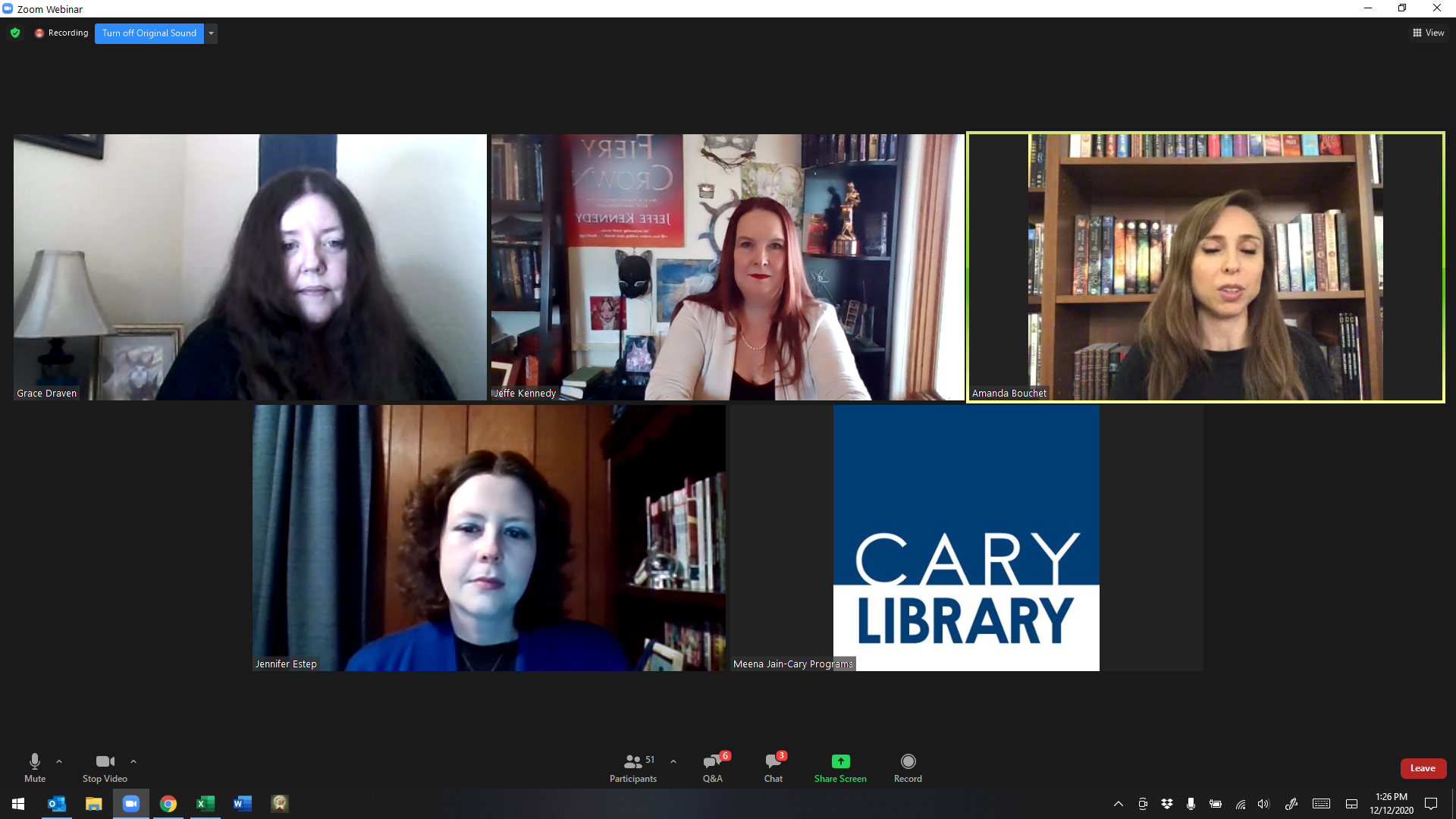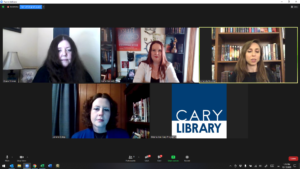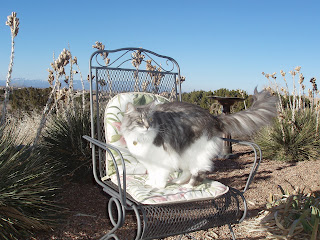

RITA ® Award-Winning Author of Fantasy Romance






 In the Las Vegas trip recap yesterday, I told you the saga of us trying to eat outside at The Restaurant that Shall No Longer Be Named because they made me mad.
In the Las Vegas trip recap yesterday, I told you the saga of us trying to eat outside at The Restaurant that Shall No Longer Be Named because they made me mad.
Still, when the manager got involved, he magically cleared a table for us right at the rail in a prime people-watching spot, as our lovely waitress noted. I don’t remember it being so prevalent before, but now that there are such better sidewalks between the casinos, there’s an unending stream of people walking up and down the strip. Not a population to waste an opportunity, other people dress up in various costumes and entice the passers-by to pose with them for a tip.
One guy had a big snake. Another dressed up (barely) as a mostly naked Trojan warrior. There were Star Wars characters, cartoon characters and variations on fantasies. (See aforementioned mostly naked Trojan warrior.) Right by our table was a couple dressed up as Winnie the Pooh and Tigger. Tigger kept taking off her costume head, revealing a slightly dumpy, very displeased looking young woman. Pooh – a slightly dumpy, not very prepossessing guy, it turned out – kept trying to coach her along. She would put her costume back on and wave from time to time.
But she was clearly not into their money-making scheme. The nearby Cookie Monster/Elmo duo were doing far better.
David and I watched this for some time and we agreed this would be a miserable way to try to make money.
Then came along the Guy in the Pink Suit. David snapped a pic of him for me. It’s not great, but it’s the best we could get without drawing his attention. This was his “costume.” White slacks, pink shirt, pink tie, pink sports coat. He affected a New York Italian accent and manner. He worked the crowd with a “Hey, how ya doin’?” shaking hands and shmoozing the women.
We weren’t sure what his angle was. Pooh and Tigger had stuck up a hand-lettered sign saying they did pics for tips. The Guy in the Pink Suit carried a little gym bag and mainly talked to people. We speculated he was a pimping a show or a club. We asked the waitress and she said she sees him all the time and has no idea who he is. The others, she said, pose for pictures – though that sign is new. She wrinkled her nose at the hand-lettered sign. I said I thought the sign was a little tacky and she said yes, that she doesn’t have a sign around her neck saying she waitresses for tips. As for The Guy in the Pink Suit, she really didn’t see him getting tips.
At our leisure, we watched him. For every ten, twenty or thirty people who passed him by, refused to shake his hand, gave him suspicious or mean looks, one would smile and talk to him. Once he got the smile, he’d talk them into a photo. He picked out the women – usually the moms no one paid attention to, or the gussied up young women looking for admiration. We could hear him saying how beautiful they were, kissing their hands, slipping a familiar arm around their shoulders. When they tipped him – which they sometimes did – he kissed them. Usually on the cheek, sometimes on the lips. If the woman was part of a couple, he’d talk the male companion into a photo, too, where they’d mug for the camera and act like Wise Guys on the strip.
The remarkable part was how he put himself out there and took rejection after rejection, never losing his energy and spark. Sometimes five or ten minutes would go by before someone would accept his gambit.
I couldn’t do that, I said.
And then I realize, I do.
All writers do. Perhaps I should expand that to all entertainers. We offer a smile, a handshake, an offer to amuse you for a moment. And most people walk by with a turned-away face or an indifferent scowl. Every once in a while someone smiles. Will you get a tip? Maybe yes, maybe no. Sure, once you get the starring role with the twenty-story high billboard of yourself, you don’t worry about it so much. Until then, though, a lot of us are busking on the streets.
Tigger girl had a cute costume, but she didn’t know how to work it. Or didn’t care to. This guy took a pink jacket and turned it into a character.
More, he turned it into success. I’m sure I saw a couple of bigger face bills change hands.
After we finished eating, we went out front, so I could get my photo and my kiss. David had the camera and the $5 bill ready. Just as we got out there, The Guy in the Pink Suit gathered his gym bag and headed down the street at a good clip. I guess it wasn’t meant to be.
Every time I send a query now or read a review, I’ll think of him and how many times I saw him face rejection in the course of two hours.
And how he immediately turned to the next person.
Hi, Beautiful! How ya doin’?
 Why are winter sunsets so much more dramatic? Must have to do with layers of air and lots of moisture.
Why are winter sunsets so much more dramatic? Must have to do with layers of air and lots of moisture.
The fabulous and funny Tawna Fenske has a post up today about stretching her, um, horizons by reading Petals and Thorns. I’m so pleased she enjoyed the story. Quite a few people now have read Petals and Thorns as their first real foray into erotica. I feel like the wild friend who convinces everyone to do tequila shots and enter the wet t-shirt contest.
I can live with that.
Yesterday another writing friend told me that, when her first book was published, her own mother gave it three stars on Amazon. That’s three out of five, for those not glued to Amazon stats. My friend said her mother had wanted to be a writer when she was younger, but gave up. She suspected jealousy was at work and she’s likely right.
Still, it gives lie to the idea that we can run around shouting that our mother loved the book so it must be a best-seller.
Rejection is part of a writer’s life as much as sitting down and assembling words. It’s the nature of the business, from newbie to best-seller. Joyce Carol Oates even mentioned this in her incredibly moving essay Personal History, published in the December 13 issue of the New Yorker. (Here’s the link to the online edition, but you have to subscribe or purchase the issue to read it, which is well-worth it, I think.) The essay describes her husband’s death after nearly 46 years of marriage. This bit was an aside, just a descriptor of their relationship, but it struck me:
In our marriage, it was our practice not to share anything that was upsetting, demoralizing, or tedious, unless it was unavoidable. Because so much in a writer’s life can be distressing – negative reviews; rejections; difficulties with editors, publishers, book designers; disappointment with one’s own work, on a daily or hourly basis – it seemed to me a good idea to shield Ray from this side of my life as much as I could. For what is the purpose of sharing your misery with another person, except to make that person miserable, too?
She goes on to explore the ways she needed him as a wife, not as a writer. I remembered this when my friend told me about her mother giving her three stars. The people in our lives don’t always understand the pain of rejection – even the moderate pain of a meh review from someone who should be blindly enthusiastic.
I’ve stopped talking about my rejections and set-backs with anyone but my close writing friends. To them, I can say “100 pages!” or “full request!” and they know my excitement. I can tell them I got a pass and they ask if it was a good one, a bad one or stock. They know how to console me and kick me to keep going.
People not involved in this arcane world, much as they might sympathize, can’t really get into how it all works. And I’ve come to think they shouldn’t have to. They come back to us with suggestions like maybe we should write another book or, hey! self-publish. They reassure us that getting published is really hard and maybe not for us. One friend’s husband suggested that she should add in more about what people are wearing and make it sexy.
We know they mean well. We do. We love them for it even as we’re choking back the explanations about the many ramifications of self-publishing or which genres discuss fashion and which don’t.
It’s just better not to go there in the first place because the thing that is fundamentally difficult to explain is that rejection is part of our Opportunity Cost.
You didn’t know I knew fancy economics terms, did you?
Okay, it’s a fake-out. This the only one I know, besides supply & demand, and I just learned it yesterday. A writer was talking about how she was multi-published and didn’t want to brag, but had received very few rejections. A glance at her pub list shows her work is with e-presses, and not the top tier. I’m not saying they’re not selective. All reputable e-presses have a selection process. I’m saying they’re not as selective as the Big Six. They’re not a selective as 99% of the agents out there. When you’re going for bigger stakes, the opportunity cost is higher. That means you get more than a few rejections.
It might mean you get a trainload of rejections.
That’s the part I find hard to explain. I have a healthy helping of ego and I want the brass ring. I’m willing to keep tossing my work into the ring with NYC’s hungriest lions, even if it means watching them slice it into shivering bits. I’m willing to pay that price.
The people who love me can’t stand to watch the show. I don’t blame them a bit.
And that’s okay. I can keep the misery to myself. It’ll make sharing the triumphs even better.

As I suspected it would, the sun rose again today.
When it set last night, I had a “no” from the agent. I knew it when I saw the email pop up. A lovely “no.” The very best kind of “no,” all of my writing buddies hasten to reassure me.
She says:
Thanks so much for sending the full manuscript of OBSIDIAN and for giving me time to read it!I love the world you’ve created here and I definitely recognize your talent. Unfortunately, I am going to pass on the offer of representation. For me, I just didn’t fall in love with the characters enough, or their adventures in your wonderful world. I’m sorry – I wish I had better news for you. I know you have lots of excitement going on right now with your work and I know you’ll be in good hands!Wishing you the very best in your publishing career!
But it means nothing in the end. It doesn’t really matter if it’s your annoying mother or the fact that you have a cowlick that can’t be controlled or a tendency to ramble on about how much it annoys you when people speed up when they see you trying to change lanes. They don’t want to buy the cow and that’s all you need to know. Tasty milk, but no thank you.
So, I got back on the horse. Nudged a couple of agents with fulls and partials. Got on Match.com (Publishers Marketplace) and picked out a couple of sexy-looking possibilities. Gave ’em a wink.
The birds and Isabel say it’s Springtime. Mysterious plants are coming up — mysterious because we only moved here in August and someone else planted these spring bulbs. I’m putting my bets on Daffodils and Hyacinths, by their nubby tops.
And meanwhile a project I’ve been seeding for a while at work may be coming to fruition at a time we really need it. My boss is happy and loves me forever.
Also, Allison, who has the lucrative multi-book contract I covet, just received a 26-page revision letter. Single-spaced. It’s like she’s got the wedding all set, and just found out she’s got to have radical cosmetic surgery first. She’s getting over it now, though we were both shocked to read the comments at first. In the end, she’ll have a much stronger book. But, oh, the pain and suffering.
I’m working on the next novel, which is winding into a dark forest of odd characters and a mixed-race little girl witch. Who knows how I’ll sell this one.
The lovely thing for me is, I don’t have to worry about that.
People talk a lot about honesty and wanting it.
I’m persuaded to think that they’re lying about this.
Perhaps they lie only to themselves and, since that’s as human as pretending that alcohol has no calories, it’s commonplace. Oh wait. That’s the same thing.
At any rate, a friend of mine from long ago posted on Facebook that a girl he liked who said she “wasn’t dating” turned out just not to be dating him. He lamented that he hadn’t learned this line in 40 years. I attempted to defend my gender saying that we don’t want to hurt a guy’s feelings with the honest answer, which could be “ick.” Another commenter said he’d want the honest “ick” so he could learn what to improve on.
The thing is, I think he got the honest “ick” to begin with and didn’t want to hear it.
There’s “ick” on many levels in life, from the color of a shirt, to the taste of avocados, to your best friend’s new boyfriend. And often there’s absolutely no reason for it. Maybe you got sick on bad avocadoes once, maybe it’s just a texture thing. Maybe you secretly think it makes you interesting not to eat avocadoes, gallantly passing on the tableside guacamole with a wry smile.
I’m not sure there really is an honest reason for rejection.
Writers lament that agents and editors don’t give good reasons for rejections. There’s the nearly universal “full client list,” which is really not far off the “I’m not dating right now” response. If the perfect manuscript came along, of course there would be room. More often you get the “not for me,” which is the nicest way they’ve found for saying “ick.” Just I don’t like avocadoes ick, not I wouldn’t rep you if you were the last author on the planet ick.
One hopes, anyway.
That’s the beauty of a little fudging, a gentle dishonesty: you don’t have to elucidate the level of ick. Believe me, I’ve been rejected, too, both as a writer and as a female. The honesty of some of those male rejections left me bruised for years. I didn’t need to know how deep the ick ran.
Because, in the end, it didn’t matter. “Not for me” is really the most honest explanation there is.
(And no, I haven’t heard back from the agent yet. Here I am, sitting by the phone, hoping she meant it when she said she’d call…)